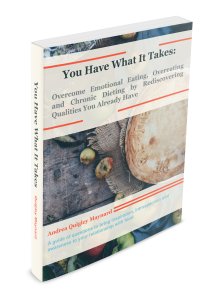
Should you weigh yourself if you have a history of eating issues?
I’ve decided to cut back from posting a new blog every week to just 2 a month. I’ve been pumping out a new blog every week for a long time and my brain is starting to feel a little fried when it comes to keeping the content fresh. On one hand I’m kind of bummed to take a break from it (I love to not break a long streak!) but I also need to listen to my needs and get out of that kind of perfectionism. I think backing off a little will help bring back some creativity that I feel I’ve been lacking in my writing lately. It will at least free up some of my time to work on other things I want to do in my business which is something I have to do.
Today’s topic is a question that I hear many people asking and my answer is a little more unconventional than you might think considering the business that I’m in.
Is it okay to weigh yourself?
Should you throw out your scale if you’ve struggled with body image issues or disordered eating?
This is a question that comes up a lot for women who have struggled with some aspect of their relationship to food or their body. Many health and mental health professionals and those in the body positive movement usually recommend that we toss out our scales.
I personally think it depends on the individual person and their specific relationship with the scale.
I go through periods where I weigh myself daily and then I sort of walk away from it for awhile and might only weigh myself once or twice a month, sometimes I go through longer stretches where I don’t weigh myself for a few months (mostly in the winter!). This works for me. I don’t get anxious about not weighing myself and I don’t get anxious about the number when I do.
When I weigh daily, it confirms for me that the way I am eating and the amount I am exercising is the right amount for my body.
It also has helped me understand the normal fluctuations in weight that my body has week after week or throughout the month, which results in not being alarmed by them. Lots of things contribute to our weight going up or down a pound or two – salty food (up), slow digestive transit time (up), dehydrated (down), week before period (up) etc. Weighing regularly has made me very comfortable with these changes.
As someone who has been challenged in her eating habits and used to be so dependent on tracking calories to know if I had eaten too much – the scale helps confirm for me that I’m on the right track (since I no longer count calories and instead use my hunger / fullness signals as a guide). Weighing myself occasionally tells me that the way I’m living is working, that I am in tune with my hunger signals (or when my eating issues are cropping up again) and that my intuition is working. It actually reinforces some of the good things I’ve worked on in the last 3-4 years.
When I take breaks from it for longer than a few weeks at a time, I find it’s like a silent decision I’m making that I’m going to go a little rogue with my food choices for awhile. I’m choosing to silence my hunger signals and while there’s nothing wrong with doing this once in awhile, I do have a history of really going overboard for long periods when I avoid the scale. If it don’t “see” it, it’s not happening! It’s a way I can lie to myself. For me, purposely avoiding the scale is an indication that I’m heading into unhealthy territory. It’s the opposite of what you’d expect!
When I’m using the scale as a tool, it doesn’t have a ton of power over me. I don’t give the number a ton of meaning. The number doesn’t tell me I’m good or bad, that I’m worthy or unworthy. It mostly serves to tell me if I’m staying present and being honest in my choices or if I’m trying to hide from myself.
Using the scale occasionally gives this former yo-yo dieter the confidence to keep choosing foods that both give me the nutrition I need and also tastes and textures that I enjoy. When you’ve had 90 pound weight losses and also 60 pound weight gains in your life, you realize that you are someone who can easily turn a blind eye to your ups and downs, and the scale helps me keep my eyes open to my actions. It’s something I keep in my personal tool box because even though I don’t put pressure on myself to weigh a certain amount anymore (and I do think it is possible to be healthy and overweight), I do know that if I allow my weight to creep too far back up and stay up, I am increasing my risk for diabetes (too much of this in my family history) and complicating my own history of high blood pressure (and each year that passes, I would be increasing those risks). I’m heavily motivated by living longer and healthier than the people in my family who passed away too young and for me, I know that keeping my weight stable is an important part of this, again, for me personally.
I know this is not the right thing for every woman with a similar history as mine. And I know there are many other women who feel like they get completely crazy over the scale.
It’s important to know yourself and listen to what is right for you, rather than doing what the masses are doing, or what a stranger on the internet says (that includes me – just because I’m sharing that using a scale helps me stay mindful, doesn’t mean that my answer is right for you).
Some women really become obsessed with the scale in a very unhealthy way. If the number on the scale isn’t a number they like, it can ruin their day or their whole week, it can make them restrict food and punish themselves with harsh exercise. It can make them feel helpless, worthless and value themselves less. Feeling this way can lead to really unhealthy behaviors. For these people, not weighing themselves is a better idea. Using a scale causes them stress, anxiety and depression. In these cases, it’s not a tool, it’s punishment.
The key to knowing if you can continue weighing yourself or not is how much meaning you give it. In my opinion (and experience), if you can use the scale as a tool in a neutral way, that has about as much effect on how you feel about yourself you as tying your shoes does, then it’s probably okay to keep using the scale in some way. If you can step off the scale and not feel virtuous or ashamed, you might be able to still use it. If you don’t feel the need to do something in retaliation to what number is on the scale, you may be able to still use it. It’s important to know how it affects you.
If you are wondering if you should toss your scale out or not, ask yourself:
How do I feel after I weigh myself?
Do I feel virtuous or depressed depending on the number I see?
Do I feel the urge to do “something” to affect my weight in response to the number I see?
Does even thinking about giving up the scale make me feel very anxious? Why?
When in doubt, talk to your doctor or a professional you trust who is aware of your history to discuss what would make the most sense for you. And trust your gut!
Do you need more support with emotional eating? Come join my Ending Emotional Eating Group on Facebook to talk with other women going through the same thing. We’d love to see you there!
Have you gotten my newest free guide You Have What it Takes? If you’re an emotional eater, overeater or longtime dieter who wonders if she has what it takes to change her relationship with food, then this for you. And it’s free. Click on the image below, then enter your name and email and it’s yours!











